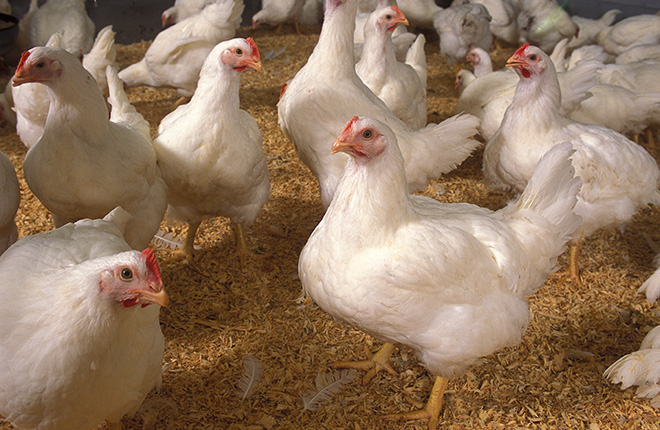Better Evaluation for Poultry Vaccines
Newcastle disease is caused by virulent strains of a diverse group of viruses that result in severe illness in chickens and other birds. The virulent strains are exotic to poultry species in the United States but are regularly found in poultry in many foreign countries. There, outbreaks can kill 80 to 90 percent of infected birds that have not been vaccinated or previously exposed to a less virulent Newcastle disease virus (NDV).
Under experimental conditions, close to 100 percent of healthy chickens vaccinated with available commercial NDV vaccines can survive an infection with virulent NDV. These vaccines also perform well under field conditions where virulent virus is not common. However, they often fail in countries where virulent viruses are endemic.
Some veterinarians stress the need for genotype-matched vaccines—those containing genes from the virulent virus, says microbiologist Claudio Afonso at the Agricultural Research Service’s Southeast Poultry Research Laboratory (SEPRL) in Athens, Georgia. Others believe the current vaccine-application process is flawed.
Afonso, veterinary medical officer Patti Miller, and their colleagues in SEPRL’s Exotic and Emerging Avian Viral Diseases Research Unit have developed an NDV vaccine-evaluation procedure that could help settle this discrepancy.
“NDV strains are closely related, and theoretically, vaccines do not need to be changed frequently like avian influenza virus vaccines do,” Miller says. “Under perfect conditions, many vaccines work, but conditions are not perfect in the field. Chickens sometimes get less than the required vaccine dose and don’t always have time to develop an immune response.”
The traditional method used in selecting NDV vaccines does not compare vaccines and only measures survival rates under optimal conditions—meaning the vaccinated birds are healthy, the correct vaccine dose is given, and the birds have 2 to 3 weeks to develop an immune response before being exposed to the virus.
“Our vaccine-evaluation procedure does compare vaccines. In a controlled study, we gave some birds a vaccine that was made using genes from the same viral strain—or genotype—as the virus they were later exposed to,” Afonso says. “Other birds received a vaccine made with a strain that differed from the virus they were exposed to.”
Using the improved procedure, scientists inoculated chickens with the different vaccines 1 or 2 weeks before exposure to a high dose of virulent NDV. Birds given the genotype-matched vaccine had reduced viral shedding, superior immune responses, reduced clinical signs, and greater survival rates compared to the birds vaccinated with a different-genotype vaccine.
“Using this stringent comparison, we showed for the first time that by using genotype-matched vaccines, a significant reduction in viral shedding and death may be achieved,” Afonso says. Under the traditional evaluation procedure, no significant differences in survival rates were found between vaccines.
“Scientists can use this protocol to develop improved vaccines,” Miller says. “It may also help in selecting more appropriate NDV vaccines, especially in countries where different virulent viruses are common in poultry.”—By Sandra Avant, Agricultural Research Service Information Staff.
“Better Evaluation for Poultry Vaccines” was published in the April 2015 issue of AgResearch Magazine.
Key Facts
- Newcastle disease virus (NDV) can kill 80-90 percent of chickens.
- Better vaccine-evaluation process needed.
- ARS developed new NDV evaluation procedure.
- Procedure will lead to more effective future vaccines.
Full Story







